
Today's Top 10 is a guest post from Christian Hawkesby, head of fixed income at Harbour Asset Management.
As always, we welcome your additions in the comment stream below or via email to david.chaston@interest.co.nz.
And if you're interested in contributing the occasional Top 10 yourself, contact gareth.vaughan@interest.co.nz.
See all previous Top 10s here.

1. NZ Political Polls: keeping National honest
There was a brief period this year when the polls suggested that National may be in a position to govern alone.
Since the release of ‘Dirty Politics’, National is back in the zone of looking for coalition partners. If NZ First can sneak over 5%, once again this could result in Winston Peters playing the kingmaker role following the election.
The TV3 poll released on Wednesday night also suggests that Colin Craig’s motto of keeping the Government on a short leash is appealing to voters since the release of ‘Dirty Politics’.
National 45 percent, down 2.5 percent
Labour 26.4 percent, down 2.6 percent
Greens 13.5 percent, up 0.5 percent
NZ First 6.3 percent, up 1.7 percent
Conservative 4.6 percent, up 2.1 percent
Internet Mana 2.1 percent, up 0.1 percent
Maori Party 0.7 percent, down 0.1 percent
United Future 0.4 percent, up 0.2 percent
ACT 0.3 percent, no change
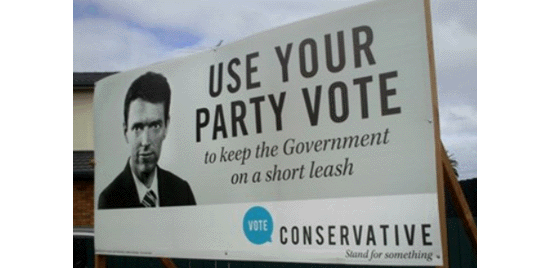
2. NZ Houses as Affordable as in 1985
National announced its first time buyer’s policy this week.
At the same time, there was an interesting piece of research released by the NZ Property Investor Federation.
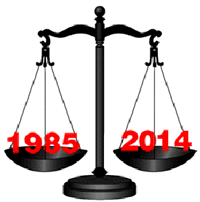
The Federation has researched changes in housing affordability from 1985 to today and says once interest rates are factored in, the average monthly cost of buying a house over 25 years on a principal-and-interest mortgage had barely increased since 1985, as mortgage interest rates have fallen from 18% to 6.3%. It says it is also comparatively "cheaper" to rent now than it was in 1985, though the deposits needed to buy homes are bigger, making it tough for youngsters to get their foot on the housing ladder.
3. RBNZ - from hikes to hold
Having lifted the Official Cash Rate 100 basis over the course of 4 months, the Overnight Indexed Swaps market is now pricing less than 50 basis points of additional hikes over the next 12 months.
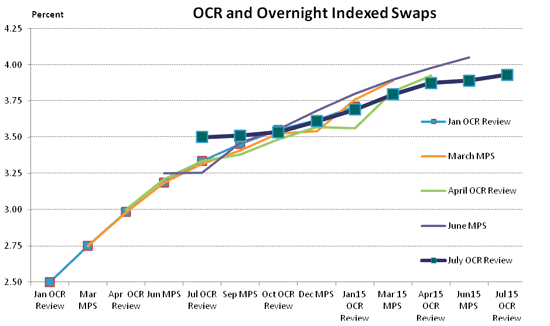
4. The end of the glory age for term deposits?
Historians may look back at the period between January 2009 and July 2014 as the golden age for investors in term deposits. New funding and liquidity regulations meant that banks were willing to pay much more attractive interest rates on 6 month retail term deposits than on traditional wholesale money market instruments.
In 2010, the gap almost reached 2 percentage points.
However, over the past 6 months, bank term deposit rates have not kept up with the full extent of increases in the OCR. The gap between 6 month retail deposit rates and the wholesale 90 day bank bill rate is now the narrowest in 5 years.
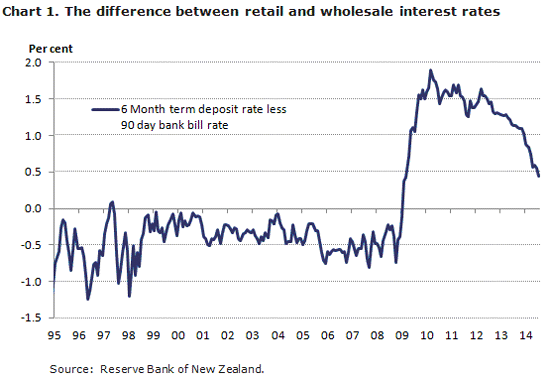
5. Labour markets are complicated
The Kansas Fed’s conference at Jackson Hole has become an annual event for global central bank watching, waiting for clues on the next policy moves. Janet Yellen gave a carefully balanced speech, giving away very little.
The major theme was that the job of measuring spare capacity in the US labour market is complicated and complex. The 1,899 words in the footnotes of the speech illustrated that Fed is looking at every conceivable bit of research to guide their policy judgements.
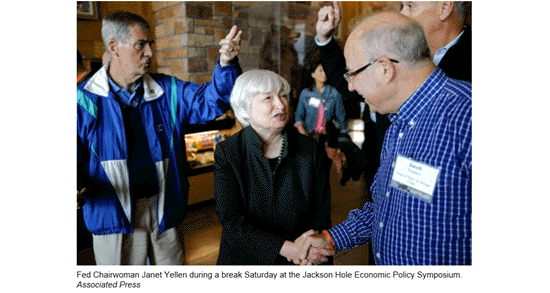
6. Structural reforms to complement monetary policy
With Yellen offering little clues, Mario Draghi stole the spotlight at Jackson Hole. His speech reinforced expectations that the ECB will provide more stimulus.
However, he also emphasised the need for fiscal action and structural reforms. The chart below makes a striking comparison between Spain (ES) and Ireland (IE).
The key message is the a more flexible labour market in Ireland meant that wages could adjust, so that unemployment didn’t have to rise as much as in Spain. Monetary policy can’t fix all Europe’s problems.
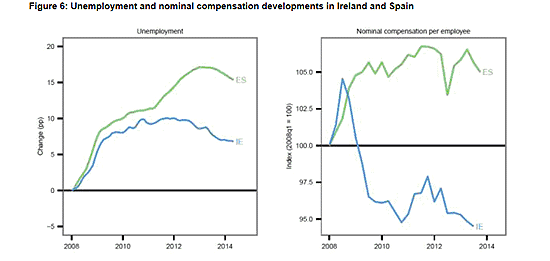
7. France continues to stand out for the need to reform
France continues to stand out for the need to reform. This article from Bondvigilantes makes the case.
France has a unique social model. It originates from the end of the Second World War, when the National Council of the Resistance (NCR) hastily put together a plan to rebuild the country after five years of Nazi occupation. Despite not having any official political affiliations, the NCR was in fact influenced by left wing individuals and the “National Front”, a communist party. The NCR’s “action plan” helped shape France in the aftermath of the war and is one of the reasons today that trade unions have such a prominent position in society and why the French are so fond of their “established social rights”.
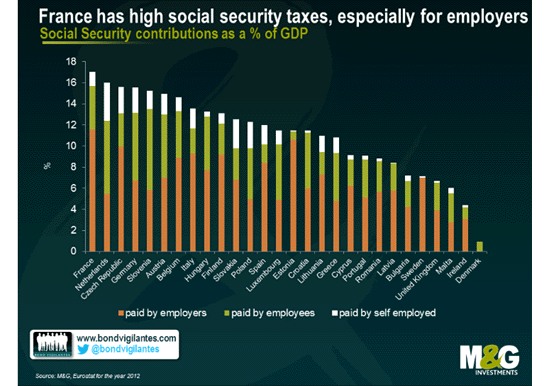
8. Hollande purges government
The pressure is showing on French politicians. Francois Hollande’s satisfaction ratings are now in low single digits, and he has been forced to announce the second government reshuffle since March. Europe has an unstable core.
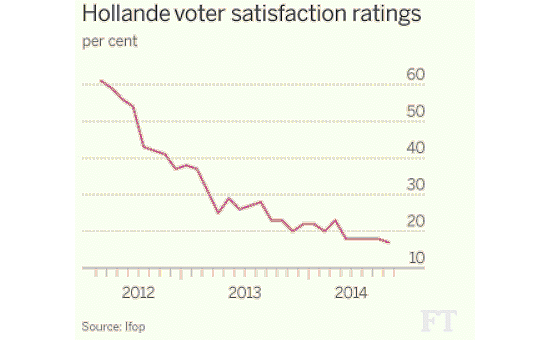
9. Scottish independence referendum
Two days before New Zealand’s general election, the Scottish people will vote on independence. In the second live debate, Alex Salmond staged a dramatic comeback against Alistair Darling, turning the tide on the first debate where Darling and the pro-UK Better Together campaign dominated the stage.
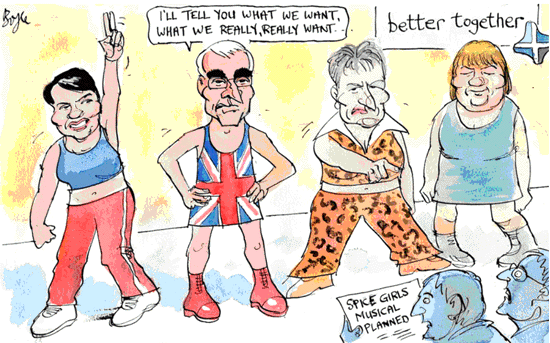
10. "All Blacks in crisis and losing their aura"
If you think it’s hard to research and predict financial markets, spare a thought for sport reporters and commentators.
Only a week ago they had written the All Blacks off as being in crisis and losing their aura.

19 Comments
That graph just shows a chart that with austerity could be made alot worse.
That is the difference between austrians and keynesian. The former wants austerity which has domonstratably made things worse, while the latter wants to avoid that and at the least not make things worse.
A simple example is NZ, the Nats avoided austerity and our economy didnt implode.
regards
Ha - crazy old PK and his love of publishing verifiable facts.Still, as "everyone" knows, facts have a liberal bias.
Remember when Bill Gross took that massive bath when everyone -especially the bond vigilantes - just knew that QE meant inflation would soar.
You missed the austrians/loopy right betting on gold. They just new with huge hyper-inflation just round the corner meant gold would soar to $3000 and even $5000 an ounce., instead a 30%+ haircut, thats some loss.
regards
is the link for number two workign for other people? It just takes me to an advert
Apropos of nothing (he says his name is William, but I'm sure his name is Bill, Willy or Mac or Buddy) - sorry - Sheryl Crow.
Where wuz I, oh ya.
Great interview with AEP here.
Re #2 aboot them Hooses - cherry-picking a starting period for a comparison series, in the midst of one of the worst tops in interest rates we've seen in half a century, shurely qualifies as Devious, no?
S'Friday and well into beer'n'pizza time, so I'll see ya and raise ya one:
Ry Cooder, classic bottleneck guitar.
'We worked through spring and winter
Through summer and through fall
But the mortgage worked the hardest and the steadiest of us all
It worked on nights and Sundays
It worked each holiday
It settled down among us
And it never went away....'
And in case y'all are thinking of Trumping me (a subtle shift in card mode there) here's one for South Awkland: - a Blind Alfred Reed cover.
'Now most all preachers preach for gold and not for soul
That's what keeps us poor folks always in a hole
We can't hardly get our breath
Taxed and schooled and preached to death
Tell me, how can a poor man stand such times and live?'
The most cynical cherry-picking of dates I have ever seen.
For the under-55 crowd this was a horrendous time for the average punter. The Labour government had just deregulated the most socialist economy after Albania (created, ironically, by the Nats). Numbers were crazy until they found their true level. The LVR crowd were taking second mortgages at 22%.
The point though is that very few chose to take mortgages at 18%. Most had it done to them after taking out government-backed 3% mortgages.
For this "research" to have any meaning at all it would have to show that the property market was behaving the same way as it is now. From memory the market was definitely not experiencing 5%+ real price growth year on year while interest rates were that high.
Please remind me never to do business with Harbour Asset Management if their staff are this gullible.
Colin Craig is not only untainted by the dirt , but he also has some other redeeming qualities .
He is young unlike some of the other past -use-by-date idiots in Parliament.
He comes across as human , he makes mistakes ( none of which are dishonest so far ) , he walks like a duck , and seems like a lanky awkward schoolboy . He is quite ordinary , like the rest of us .
He has been bullied relentessly by the media, and Kiwis can see this for what it is .
His policies on family values and integrity are what ordinary middle class Kiwis may warm to
He is open and frank and speaks without the soundbites and BS
And who cares what he thinks about people who went to the moon in a rocket propelled drum a whole generation ago ? It has no bearing on us today whatsoever
Some quick research leads me to the conclution that have a very valid point Boatman. Binding referandums sound especially sweet to me, because it'll mean we have a way to challenge what our elected reps think we want.
Why isn't the Conservative party much bigger?
It doesn't look like Colin Craig believes that men never landed on the moon, his answer seemed fairly netural and casual to me, especially given that the question didn't seem to pertain to politics at all.
#2 It may be that housing is as affordable now as it was in 1985.
The difference (and I do not have the figures) is that 11% interest on a 4x income mortgage is more comfortable than 5.5% on 8x income.
The interest cost may be the same relatively but the monkey on your back is one twice as high and the potential for market collapse is greater.
I think the other thing to remember is that interest rates CHANGE over the term of the loan. We can't lock in for the 30 year period. So who knows 10 years from now what will happen.
FWIW we had a mortgage in 1972 at 6% on 3x one income and with the then inflation had it paid back in just 6 years .
Could you do that now?
Depends on the size of the loan and your income. Maybe if you received a large bequest or won powerball.
Very correct, unless income is factored in this piece is pure BS. The organisation releasing it has no vested interest in us believing it right? Yeah Right!
#10 The only reason financial and sports forecaster exist is to make fortune tellers look good.
Hmmm wonder why they picked 1985. If I remember rightly that would have been the time when everything was flying high (for a fall) before the crash of '87. Yes, odd indeed that 1985 should be chosen.
The only comparison worth making is average house price to average wage. Nothing average would have 15x the average wage in 1985 - median even. Although back then the average and the median would have likely been fairly close to each other.
We welcome your comments below. If you are not already registered, please register to comment
Remember we welcome robust, respectful and insightful debate. We don't welcome abusive or defamatory comments and will de-register those repeatedly making such comments. Our current comment policy is here.